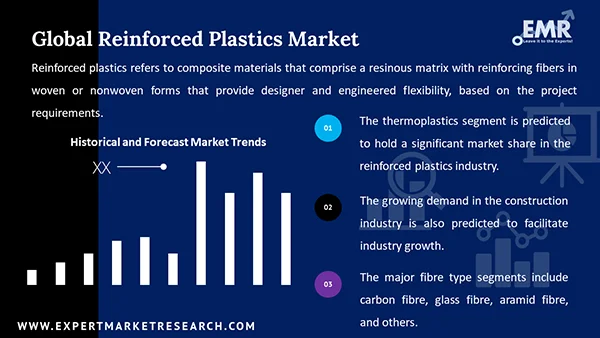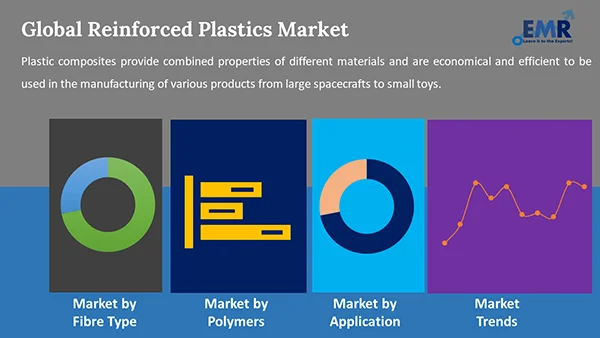
Consumer Insights
Uncover trends and behaviors shaping consumer choices today
Procurement Insights
Optimize your sourcing strategy with key market data
Industry Stats
Stay ahead with the latest trends and market analysis.
Trending Now



The global reinforced plastics market stood at a value of more than USD 242.49 billion in 2024. The market is estimated to grow at a CAGR of 4% in the forecast period of 2025-2034 to attain a value of over USD 345.16 billion by 2034.
Base Year
Historical Year
Forecast Year







Read more about this report - REQUEST FREE SAMPLE COPY IN PDF
The robust growth of the construction industry, especially in emerging economies like China, India, and Mexico, is providing lucrative reinforced plastics market opportunities. As per Invest India, the India construction sector is projected to reach USD 1.4 trillion by 2024, buoyed by rapid industrialisation and urbanisation and favourable government initiatives. Similarly, it is estimated that overall investment in new infrastructure during the 14th Five-Year Plan period (2021-2025) in China will reach nearly USD 4.2 trillion. Favourable properties of reinforced plastics are surging their usage in the construction of access and safety structures, vehicular bridge decking, pedestrian bridge decking, balconies, tanks and pipings, and rail platforms, among others.
The growing popularity of 3D printing for creating complex and customised parts with design flexibility, improved durability and strength, lowered waste, and cost-effective prototyping is adding to the reinforced plastics industry growth. In the aerospace sector, reinforced fibres are deployed in additive manufacturing for on-demand production of customised aerospace parts, including interior parts, structural components, and ducts.
Surging renewable energy generation
The increasing renewable energy generation is boosting the reinforced plastics market revenue. By 2028, renewable energy sources are expected to represent more than 42% of global energy generation, with solar PV and solar turbine shares doubling to 25%. Due to their strength, versatility, and durability, reinforced plastics are used in the construction of wind turbine blades and solar panels that can withstand harsh environmental conditions. While solar PV generation reached nearly 1,300 TWh in 2022, wind electricity generation surpassed 2,100 TWh, as per the International Energy Agency (IEA). As surging renewable energy generation also bolsters the requirement for energy storage solutions, reinforced plastics are increasingly used in battery casings, structural components, supercapacitors, and flywheels, among others, due to their high strength, lightweight, and ability to protect sensitive electronics and resist environmental damage.
Increasing focus on sustainability
Reinforced plastics serve as a sustainable alternative to steel, concrete, and iron as they boast a lightweight nature, enhanced durability, low maintenance, and superior strength-to-weight ratios. They can also be moulded into complex shapes while minimising waste during manufacturing in sectors like aerospace, construction, and automotive. Amid the growing environmental consciousness, there is also a rising interest in bio-based reinforced plastics that are made from natural fibres like flax, bamboo, and hemp and reduce the dependency on fossil fuels. Besides, increasing attempts to recycle and upcycle reinforced plastics by key players and researchers are fuelling the reinforced plastics market expansion. In April 2024, researchers at the Korea Institute of Science and Technology (KIST) developed a sustainable and highly efficient method for recycling carbon fibre reinforced plastic (CFRP) using only water for use as electrodes in e-mobility batteries.
Technological advancements and innovations
Advancements in processing technologies like automated tape laying (ATL) and automated fibre placement (AFP) aimed at increasing the throughput, scalability, precision, and efficiency of complex reinforced composites are shaping the reinforced plastics trends and dynamics. The development of innovative production techniques is further aiding the reinforced plastics demand growth. For instance, in February 2023, Toray Industries, Inc. announced that it had developed a rapid integrated moulding technology for carbon fibre reinforced plastic (CFRP) mobility components that make it possible to fabricate large panels in a single press shot. Furthermore, researchers also are integrating actuators, sensors, and embedded electronics into reinforced plastics to develop smart composites that can respond to external stimuli and adapt to different environmental conditions. Such smart composites are anticipated to revolutionise different end-use sectors like automotive, aerospace, and consumer electronics and wearables.
July 2024
Borealis introduced a glass-fibre reinforced polypropylene (PP) compound with 65% post-consumer recycled (PCR) polymer content, Borcycle GD3600SY. The product contains 30% glass fibre and is slated to be used in centre console carriers for the new Peugeot 3008.
March 2022
The Polyplastics Group announced the introduction of PLASTRON (R) LFT, long fibre reinforced thermoplastic resins, that are made from specially formulated regenerated cellulose fibres. The resins boast reduced waste and excellent mechanical strength, which enables manufacturers to reduce their carbon footprints.
The growing demand for renewable energy is driving the reinforced plastics market growth. By 2028, renewable sources are expected to account for over 42% of global energy, with solar and wind energy leading the charge. Reinforced plastics are essential in the construction of wind turbine blades and solar panels, providing durability and strength to withstand harsh environmental conditions. Additionally, as renewable energy storage solutions such as batteries and flywheels gain traction, reinforced plastics are being used in energy storage components due to their lightweight, strength, and protective qualities.
The increasing focus on sustainability also supports the market growth. Reinforced plastics offer a sustainable alternative to traditional materials like steel and concrete, thanks to their durability, low maintenance, and ability to be moulded into complex shapes with minimal waste. There is also a rising interest in bio-based reinforced plastics made from natural fibres like flax and hemp, which reduce dependence on fossil fuels. Innovations in recycling, such as a new method for recycling carbon fibre composites developed by KIST, further enhance sustainability.
Technological advancements, including automated processing techniques and the development of smart composites with integrated sensors and actuators, are also driving market demand. These innovations are expected to revolutionise industries like automotive, aerospace, and consumer electronics.
High costs associated with fibres used to reinforce plastics, especially aramid fibre and carbon fibre, as well as their limited supply can impede the reinforced plastics market growth. While the manufacturing of reinforced plastics is energy-intensive, their recycling and reusability remain a major challenge. Moreover, reinforced plastics face stiff competition from lightweight components like aluminium alloys, engineered polymers, sandwich panels, and wood as well as natural fibres such as flax, hemp, and jute, which can limit their demand in various end-use sectors, especially consumer goods and automotive.

Read more about this report - REQUEST FREE SAMPLE COPY IN PDF
The EMR’s report titled “Global Reinforced Plastics Market Report and Forecast 2025-2034” offers a detailed analysis of the market based on the following segments:
Market Breakup by Fibre Type
Market Breakup by Polymers
Market Breakup by Application
Market Breakup by Region
By Fibre Type Insights
As per the reinforced plastics market analysis, carbon fibre, carbon atoms bonded together in a crystalline structure, is renowned for its excellent strength-to-weight ratio, low coefficient of thermal expansion, high stiffness, corrosion resistance, and electrical conductivity. Carbon fibre reinforced plastics (CFRP) are extensively used in aircraft structures, wings, and fuselages, electric vehicles and high-performance sports cars, and medical imaging equipment and prosthetics.
Glass fibres, made from thin strands of glass, are more affordable than carbon fibre, and offer good flexibility and impact resistance, excellent corrosion and chemical resistance, and electric insulation properties. Meanwhile, aramid fibres are extensively used in ballistic and protective applications due to their high impact resistance and toughness.
By Polymers Insights
Thermoplastics account for a major portion of the reinforced plastics market share as they can be recycled and reused and boast exceptional impact resistance and ductility. Due to their ease of processing using conventional methods such as extrusion and injection moulding, thermoplastic reinforced plastics prove cost-effective in large-volume manufacturing.
Meanwhile, common thermosetting resins used in reinforced plastics are polyesters, epoxy, phenolic resins, and vinyl esters. They are stronger, more rigid, and provide better heat, chemical, and corrosion resistance than thermoplastics, which makes them ideal for use in harsh environments.
By Application Insights
Design flexibility, lightweight, and excellent strength-to-weight ratio make reinforced plastics a widely used material in the automotive industry. As per the Department of Energy of the US, replacing heavy steel components with glass fibre-reinforced polymer composites can lower vehicle component weight by 50% and improve fuel efficiency by 35% without compromising the safety and performance of vehicles. The rising demand for lightweight, cost-effective, and fuel-efficient vehicles is propelling the reinforced plastics demand forecast.
Meanwhile, in the building and construction sector, reinforced plastic beams, columns, and bars are used as alternatives to steel and concrete due to their corrosion resistance, high strength, and durability. Reinforced plastics are also used for both aesthetic and functional purposes to replace the appearance of wood, metal, and stone in construction and building activities.
North America Reinforced Plastics Market Dynamics
Increasing production and sales of electric vehicles in the United States and Canada are propelling the reinforced plastics market development. As per the estimates from Wards Intelligence, combined sales of hybrid vehicles, battery electric vehicles (BEVs), and plug-in hybrid vehicles surged from 17.8% of total new light-duty vehicle (LDV) sales in Q1 2024 to 18.7% in Q2 2024. Reinforced plastics improve the energy efficiency and range of electric vehicles, provide superior crash resistance, and protect the battery pack and other sensitive items. Moreover, the growing demand for renewable energy is surging the demand for reinforced plastics in applications, such as solar panels, wind turbine blades, energy storage solutions, bioenergy systems, and hydropower infrastructure. In Canada, 70% of electricity is generated from renewable sources like nuclear, solar, hydro, and wind power.
Europe Reinforced Plastics Market Trends
As per the reinforced plastics market regional analysis, advancements in 3D printing technology are aiding the market. Reinforced plastics are used in 3D printing to create customised, lightweight parts with complex geometries. Europe has been at the forefront of the sustainability revolution, leading to the shift towards recyclable reinforced plastics and bio-based composites. The development of natural fibres such as hemp and flax as well as bio-based resins for reinforced plastics production is boosting the reinforced plastics market value.
Asia Pacific Reinforced Plastics Market Overview
The reinforced plastics demand forecast in the Asia Pacific is being aided by rapid industrialisation in countries like India and China. The thriving infrastructure, construction, and manufacturing sectors are driving the applications of reinforced plastics. Countries such as China, Japan, and India are leaders in vehicle production, in which reinforced plastics are used for performance enhancement. From April 2023 to March 2024, the automotive sector manufactured a total of 28.43 million vehicles and contributed 5.27% of the total FDI inflow.
Key reinforced plastics market players are actively investing in the development of advanced reinforced thermosets and thermoplastics with improved properties. They are also adopting innovative technologies like automation, AI-driven manufacturing, and robotics to enhance the precision and efficiency of reinforced plastic manufacturing.
Teijin Limited
Teijin Limited, headquartered in Osaka, Japan, is a leading provider of high-performance solutions as well as advanced fibres, materials, and chemicals. Founded in 1918, the company serves different sectors such as medical, construction, electronics, automotive, renewable energy, and medical.
BASF SE
BASF SE, established in 1865, is one of the world’s largest diversified chemical companies. Headquartered in Ludwigshafen, Germany, the company is renowned for its extensive investments in research and development activities and its commitment to sustainable development. It provides chemicals and solutions for the construction, automotive, energy, and consumer goods sectors.
Binani Industries Ltd
Binani Industries Ltd, headquartered in Mumbai, India, and founded in 1962, is a leader in the manufacturing and industrial sectors. Its diversified portfolio includes fibreglass, polyester products, cement, and reinforced plastics, among others, that cater to different end-use sectors, including renewable energy, automotive, and consumer goods, among others.
Other major players in the reinforced plastics market include Solvay S.A, SGL Carbon, Constantia Industries AG, and Toray Industries, Inc., among others.
January 2022
Toyoda Gosei Co., Ltd. developed a cellulose nanofibre (CNF)-reinforced plastic to reduce carbon emissions over the lifecycle of automotive components. The new product combines 20% CNF in a general purpose plastic (polypropylene) used in automobile interior and exterior components.
April 2021
Braskem launched a new and innovative carbon fibre reinforced polypropylene filament for 3D printing ("CF-PP") ("FL900PP-CF") that offers low warpage and excellent mechanical and thermal properties. The filament enables users to 3D print rigid and lightweight parts of high-end applications in the automotive, sporting goods, and aerospace sectors.
*While we strive to always give you current and accurate information, the numbers depicted on the website are indicative and may differ from the actual numbers in the main report. At Expert Market Research, we aim to bring you the latest insights and trends in the market. Using our analyses and forecasts, stakeholders can understand the market dynamics, navigate challenges, and capitalize on opportunities to make data-driven strategic decisions.*
Get in touch with us for a customized solution tailored to your unique requirements and save upto 35%!
In 2024, the global reinforced plastics market attained a value of more than USD 242.49 billion.
The market is projected to grow at a CAGR of 4% between 2025 and 2034.
The market is estimated to witness a healthy growth in the forecast period of 2025-2034 to reach over USD 345.16 billion by 2034.
The major drivers of the industry, such as the increased demand in the construction industry, rising demand for infrastructure development, rapid technological advancements, growing demand in the production of automobile and interior and exterior, rising demand for fuel efficient passenger vehicles, and heightened demand for industrial machinery and equipment production, are expected to aid the market growth.
The key market trends guiding the growth of the industry include the increasing demand in the construction of advance engineering structures.
The major regions in the industry are North America, Latin America, the Middle East and Africa, Europe, and the Asia Pacific.
The significant fibre types include carbon fibre, glass fibre, aramid fibre, and others.
The major polymers include thermosets and thermoplastic.
The different applications include automotive, building and construction, aerospace and aviation, wind energy, marine, electrical and electronics, and others.
The major players in the industry are BASF SE, Binani Industries Ltd, Solvay S.A, SGL Carbon, Constantia Industries AG, Teijin Limited, Toray Industries, Inc. and Others.
Explore our key highlights of the report and gain a concise overview of key findings, trends, and actionable insights that will empower your strategic decisions.
| REPORT FEATURES | DETAILS |
| Base Year | 2024 |
| Historical Period | 2018-2024 |
| Forecast Period | 2025-2034 |
| Scope of the Report |
Historical and Forecast Trends, Industry Drivers and Constraints, Historical and Forecast Market Analysis by Segment:
|
| Breakup by Fibre Type |
|
| Breakup by Polymers |
|
| Breakup by Application |
|
| Breakup by Region |
|
| Market Dynamics |
|
| Competitive Landscape |
|
| Companies Covered |
|
| Report Price and Purchase Option | Explore our purchase options that are best suited to your resources and industry needs. |
| Delivery Format | Delivered as an attached PDF and Excel through email, with an option of receiving an editable PPT, according to the purchase option. |
Datasheet
One User
USD 2,499
USD 2,249
tax inclusive*
Single User License
One User
USD 3,999
USD 3,599
tax inclusive*
Five User License
Five User
USD 4,999
USD 4,249
tax inclusive*
Corporate License
Unlimited Users
USD 5,999
USD 5,099
tax inclusive*
*Please note that the prices mentioned below are starting prices for each bundle type. Kindly contact our team for further details.*
Flash Bundle
Small Business Bundle
Growth Bundle
Enterprise Bundle
*Please note that the prices mentioned below are starting prices for each bundle type. Kindly contact our team for further details.*
Flash Bundle
Number of Reports: 3
20%
tax inclusive*
Small Business Bundle
Number of Reports: 5
25%
tax inclusive*
Growth Bundle
Number of Reports: 8
30%
tax inclusive*
Enterprise Bundle
Number of Reports: 10
35%
tax inclusive*
How To Order
Our step-by-step guide will help you select, purchase, and access your reports swiftly, ensuring you get the information that drives your decisions, right when you need it.

Select License Type
Choose the right license for your needs and access rights.

Click on ‘Buy Now’
Add the report to your cart with one click and proceed to register.

Select Mode of Payment
Choose a payment option for a secure checkout. You will be redirected accordingly.
Gain insights to stay ahead and seize opportunities.

Get insights & trends for a competitive edge.

Track prices with detailed trend reports.

Analyse trade data for supply chain insights.

Leverage cost reports for smart savings

Enhance supply chain with partnerships.

Connect For More Information
Our expert team of analysts will offer full support and resolve any queries regarding the report, before and after the purchase.
Our expert team of analysts will offer full support and resolve any queries regarding the report, before and after the purchase.
We employ meticulous research methods, blending advanced analytics and expert insights to deliver accurate, actionable industry intelligence, staying ahead of competitors.
Our skilled analysts offer unparalleled competitive advantage with detailed insights on current and emerging markets, ensuring your strategic edge.
We offer an in-depth yet simplified presentation of industry insights and analysis to meet your specific requirements effectively.



Australia
63 Fiona Drive, Tamworth, NSW
+61-448-061-727
India
C130 Sector 2 Noida, Uttar Pradesh 201301
+91-723-689-1189
Philippines
40th Floor, PBCom Tower, 6795 Ayala Avenue Cor V.A Rufino St. Makati City,1226.
+63-287-899-028, +63-967-048-3306
United Kingdom
6 Gardner Place, Becketts Close, Feltham TW14 0BX, Greater London
+44-753-713-2163
United States
30 North Gould Street, Sheridan, WY 82801
+1-415-325-5166
Vietnam
193/26/4 St.no.6, Ward Binh Hung Hoa, Binh Tan District, Ho Chi Minh City
+84-865-399-124
United States (Head Office)
30 North Gould Street, Sheridan, WY 82801
+1-415-325-5166
Australia
63 Fiona Drive, Tamworth, NSW
+61-448-061-727
India
C130 Sector 2 Noida, Uttar Pradesh 201301
+91-723-689-1189
Philippines
40th Floor, PBCom Tower, 6795 Ayala Avenue Cor V.A Rufino St. Makati City, 1226.
+63-287-899-028, +63-967-048-3306
United Kingdom
6 Gardner Place, Becketts Close, Feltham TW14 0BX, Greater London
+44-753-713-2163
Vietnam
193/26/4 St.no.6, Ward Binh Hung Hoa, Binh Tan District, Ho Chi Minh City
+84-865-399-124
Share